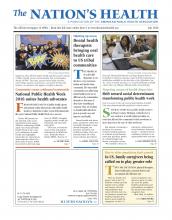Veterans delay needed medical care at rates higher than the general population, a recent study found.
Nearly 29 percent of veterans delay seeking care, compared with 17.2 percent of Americans overall who reported delaying care, according to research published online April 23 in the Journal of Public Health Management and Practice.
Delayed care could lead to poor health outcomes, such as longer hospital stays and lower quality of life, said study co-author Charles Begley, PhD, a professor in the Department of Management, Policy and Community Health at the University of Texas Health Science Center of Houston’s School of Public Health.
“No one was relating the appointment time delays to the behavior of veterans,” Begley told The Nation’s Health. “We knew this was a factor in people’s behaviors (and) their perceptions of care delays.”
The study looked at over 10,000 Americans in the 2010-2011 Health Tracking Household Survey who were separated by access to private insurance, Medicare, Medicaid and veterans health care insurance, such as via the Veterans Affairs health system. Participants were asked if they put off or postponed medical care they needed in the past year.
Seventy-six percent of people surveyed had private insurance and 17.3 percent of them reported delaying care. While less than 2 percent of the sample was covered by veterans health insurance, 29 percent of those people reported delaying necessary care.
Concerns over transportation to appointments and difficulty in scheduling them over the phone were the top reasons veterans delayed seeking health care, the study said. The same was true for participants insured through Medicare and Medicaid, according to the findings.
Across other insurance coverage, nearly 5 percent of those surveyed had Medicare coverage, but nearly 18 percent of people with Medicare reported delaying care. Just over 17 percent had Medicaid and 15 percent of them delayed seeking health care.
Researchers suggested policymakers consider new state and federal-level interventions under the Affordable Care Act to address the factors that lead to veterans delaying care.
“There clearly needs to be more research on this issue within the VA,” Begley said. “Based on our survey, it should look into satisfaction with care, transportation delays, as well as getting appointments.”
For more information, visit http://journals.lww.com/jphmp/Abstract/publishahead/Delays_in_Seeking_Health_Care___Comparison_of.99682.aspx.
- Copyright The Nation’s Health, American Public Health Association









